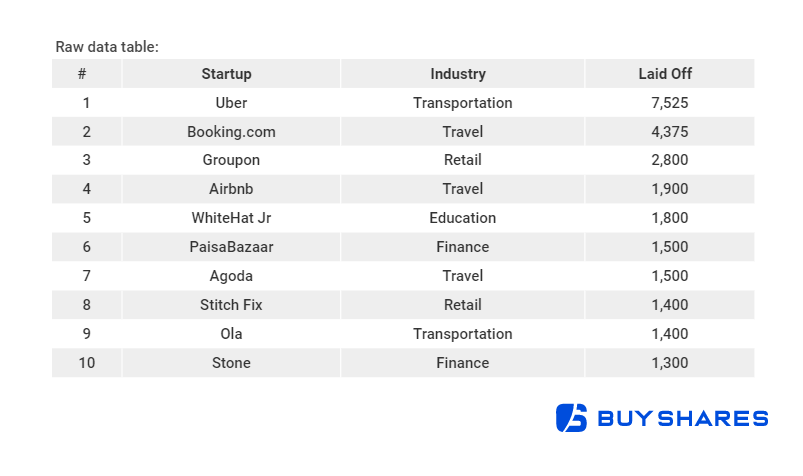Research conducted by financial company Buy Shares indicate that around 25,500 people lost were lost their jobs in the top ten largest startup layoffs in the startup space between March 2020 to January 2021.
Leading the list is cab-hailing firm Uber, with 7,525 recorded layoffs or 29.5% of all the job losses in the highlighted startups. Companies in the travel sector such as Booking.com, Airbnb, and Agoda represented a cumulative layoff at 7,775 or 30.49%.
At the bottom part of the list is financial company Stone, which laid off 1,300 jobs.

According to the report, the main driving force behind these massive layoffs is the economic downturn caused by the COVID-19 pandemic. As a means of remaining afloat, save money, and readjust their business models, most startups have resolved to roll out massive layoffs.
The travel and transportation sector took the biggest hit as wide-scale global lockdowns and strict quarantine measures effectively took away the demand for the services. The drastically reduced demand immediately impacted revenue margins, causing layoffs.
The research also shows that the financial health of the companies in the startup space before the pandemic hit did not significantly affect their standing afterwards. Though technically still a startup, Uber was by far the biggest company in the list and is already a publicly-traded company.
However, it suffered the most as its services were directly impacted by the pandemic.
That being said, the research also showed that some startups particularly in the education, telehealth, e-commerce, and remote workers’ software achieved growth.
However, not all startups in these spaces escaped unscathed. For example, WhiteHat Jr in education and Stitch Fix in retail were forced to lay off workers to remain afloat.
“Limited resources, winning customer trust, and stiff competition are just some of the challenges synonymous with startups before the pandemic. Coupled with the health crisis’s effects, the startups were forced to take radical measures to survive,” Buy Shares said in a media release.
“Therefore, a post-pandemic economy will be one of resiliency and the ability to operate across vast distances and connect with customers in ways that mimic physical interactions. Specifically, pre-pandemic challenges might still exist. The successful administration of vaccines offers hope to companies that stared at a dim future,” it said.
Paulo Rizal is a content producer for Third Sector news. He has working experience in journalism, SEO, and social media marketing.
- Paulo Rizalhttps://thirdsector.com.au/author/paulo-rizalakolade-co/
- Paulo Rizalhttps://thirdsector.com.au/author/paulo-rizalakolade-co/
- Paulo Rizalhttps://thirdsector.com.au/author/paulo-rizalakolade-co/
- Paulo Rizalhttps://thirdsector.com.au/author/paulo-rizalakolade-co/











